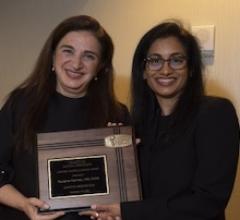
Getty Images
February 28, 2024 — Artificial intelligence (AI) may transform cardiovascular medicine. For now, though, many challenges remain, and few AI tools have been proven to improve care, according to a new American Heart Association scientific statement published today in Circulation, the Association’s flagship, peer-reviewed journal.
The new scientific statement, “Use of Artificial Intelligence in Improving Outcomes in Heart Disease,” comes amid intense attention on AI as a way to improve cardiovascular disease prevention, detection, diagnosis and treatment.
“Here, we present the state-of-the-art including the latest science regarding specific AI uses—from imaging and wearables to electrocardiography and genetics,” said Chair of the statement’s writing committee Antonis Armoundas, Ph.D., a principal investigator at the Cardiovascular Research Center at Massachusetts General Hospital and an associate professor of medicine at Harvard Medical School, both in Boston. “Among the objectives of this manuscript is to identify best practices as well as gaps and challenges that may improve the applicability of AI tools in each area.”
AI has the power to analyze vast amounts of data and make predictions, typically for narrowly defined tasks, such as providing clinical and mechanistic insights in basic, translational, and clinical studies. Machine learning leverages statistical and mathematical models and algorithms to detect patterns in large datasets that may not be evident to human observers using standard approaches. Deep learning, a subfield of machine learning, is the practice of taking very complex data sets and matching them with useful labels, for example in image recognition and interpretation.
Use of these technologies has led to the analysis of electronic health records (EHRs) to understand various treatment effects, to compare the effectiveness of tests and interventions, and, more recently, to build prediction, classification and optimization models to help inform clinical decision-making. AI applications in cardiovascular care include cardiac imaging, electrocardiography (or ECG, bedside monitoring, implantable and wearable technologies, genetics and the interpretation of EHRs.
Gaps and Challenges
According to the statement, limitations in the use of AI and machine learning across all areas of cardiovascular medicine include:
- Protocols that ensure appropriate information sourcing, selecting and organizing, as well as sharing and privacy are critical. Potential ethical and legal challenges also need to be addressed.
- A greater scientific knowledge foundation is needed. Current AI-based algorithms lack prospective research or studies that model the effects of AI in order to closely examine its potential impact in the future. There are urgent needs for prospectively collected information, clinical trials and development of automated workflows to launch and maintain specific tasks that may improve efficiency.
- Implementing AI algorithms in practice may be limited by a lack of standardized platforms across the health care industry to report predictions and scale findings in data sets.
- The authors also express the need to develop regulatory pathways for AI-enabled technologies in the U.S. to ensure safety and effectiveness to mitigate harm as technologies rapidly evolve.
“Robust prospective clinical validation in large diverse populations that minimizes various forms of bias is essential to address uncertainties and bestow trust, which, in turn, will help to increase clinical acceptance and adoption,” Armoundas said.
AI by Cardiovascular Application
The authors reviewed several areas of AI use in cardiovascular medicine including:
Imaging. Imaging is important for accurately diagnosing cardiovascular conditions and stroke. AI and machine learning tools look to address inconsistencies in human interpretation and relieve overburdened experts in cardiac and brain image processing. Using AI and machine learning for interpreting imaging tests more broadly is challenging because representative imaging data sets are often not available; also, how these technologies affect clinical results needs to be validated in each area of use.
Electrocardiography. Among the promising uses of AI is interpretation of electrocardiography, which measures the heart’s electrical activity. AI has helped to automate ECG interpretation by identifying subtle results that human experts might not see and predict changes that suggest abnormalities that are not yet evident.
Implantable and Wearable Technologies. Implantable and wearable technologies can interpret health information on a nearly continuous basis, which may help in more rapid identification of decline in function and/or need for monitoring improvement or seeking methods of intervention. Ultimately, these devices unlock a level of remote monitoring that could play a more direct role in facilitating successful outpatient care. In some cases, wearable devices may help reduce disparities in care and may help improve wellness. Still unaddressed are ways to identify which patients and conditions may be best for AI- and machine learning-enabled remote monitoring, and to develop and validate treatment protocols for each.
The authors note that consumer wearables, including smartwatches and fitness trackers that detect physical activity, heart rate, and other physiological parameters, may or may not include FDA-approved components. Effectiveness and accuracy of wearable devices vary based on many factors including the type of sensor(s) in the device. Overall, gaps remain in how to standardize optimal use of these devices and how to address cost-effectiveness, implementation, ethics, privacy, safety, equitable access and more.
Genetics. While AI algorithms have enhanced the ability to interpret genetic variants and abnormalities, the writing committee cautions against using these tools to make definitive classifications.
“Numerous applications already exist where AI/machine learning-based digital tools can improve screening, extract insights into what factors improve an individual patient’s health and develop precision treatments for complex health conditions,” according to Armoundas.
“There is an urgent need to develop programs that will accelerate the education of the science behind AI/machine learning tools, thus accelerating y the adoption and creation of manageable, cost-effective, automated processes. We need more AI/machine learning-based precision medicine tools to help address core unmet needs in medicine that can subsequently be tested in robust clinical trials,” Armoundas said. “This process must organically incorporate the need to avoid bias and maximize generalizability of findings in order to avoid perpetuating existing health care inequities.”
This scientific statement was prepared by the volunteer writing group on behalf of the American Heart Association’s Institute for Precision Cardiovascular Medicine; the Council on Cardiovascular and Stroke Nursing; the Council on Cardiovascular Disease in the Young; the Council on Cardiovascular Radiology and Intervention; the Council on Hypertension; the Council on the Kidney in Cardiovascular Disease; and the Stroke Council. American Heart Association scientific statements promote greater awareness about cardiovascular diseases and stroke issues and help facilitate informed health care decisions. Scientific statements outline what is currently known about a topic and what areas need additional research. While scientific statements inform the development of guidelines, they do not make treatment recommendations. American Heart Association guidelines provide the Association’s official clinical practice recommendations.
Writing committee members and co-authors are Vice Chair Sanjiv M. Narayan, M.D., Ph.D., FAHA; Donna K. Arnett, Ph.D., FAHA; Kayte Spector-Bagdady, J.D.; Derrick A. Bennett, Ph.D.; Leo Anthony Celi, M.D.; Paul A. Friedman, M.D.; Michael H. Gollob, M.D.; Jennifer L. Hall, Ph.D.; Anne E. Kwitek, Ph.D., FAHA; Elle Lett, Ph.D.; Bijoy K. Menon, M.D.; Katherine A. Sheehan, Ph.D.; and Salah S. Al-Zaiti, Ph.D. Authors’ disclosures are in the manuscript.
The Association receives funding primarily from individuals. Foundations and corporations (including pharmaceutical, device manufacturers and other companies) also make donations and fund specific Association programs and events. The Association has strict policies to prevent these relationships from influencing the science content. Revenues from pharmaceutical and biotech companies, device manufacturers and health insurance providers, and the Association’s overall financial information are available here.
For more information: www.heart.org


 November 14, 2025
November 14, 2025 









